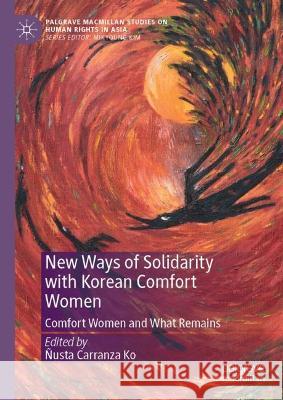New Ways of Solidarity with Korean Comfort Women: Comfort Women and What Remains » książka
New Ways of Solidarity with Korean Comfort Women: Comfort Women and What Remains
ISBN-13: 9789819917938 / Angielski
New Ways of Solidarity with Korean Comfort Women: Comfort Women and What Remains
ISBN-13: 9789819917938 / Angielski
(netto: 480,64 VAT: 5%)
Najniższa cena z 30 dni: 501,19 zł
ok. 20 dni roboczych.
Darmowa dostawa!
This book provides a space for victims’ testimonies and memories, engages with their experiences, reflects upon the redress movement, and evaluates policies related to Korean comfort women as victims and survivors from the international, domestic, and bilateral realms. Collectively, this edited volume aims to further diversify the scholarship on comfort women, contribute to the existing literature on social movements related to comfort women and other related studies, and, in doing so, challenge the politicization of comfort women. With this objective, the book presents scholarship from interdisciplinary fields that revisit the meaning of victims’ testimonies, memories, and remembrance, social movement efforts on comfort women, and the related role of government, governance, and society by reflecting on the truths about the historical past. In so doing, it initiates new conversations among political scientists, sociologists, historians, and cultural and literary scholars. What do victims’ testimonies reveal about new ways of imagining historical memory of Korean comfort women? How are memories of comfort women and their experiences remembered in social movements, literature, and cultural practices? Where is the place of comfort women’s experiences in politics, diplomacy, and global affairs? These are some of the questions that guide the contributions to this edited volume, which seek to establish new ways of solidarity with comfort women.
This book provides a space for victims’ testimonies and memories, engages with their experiences, reflects upon the redress movement, and evaluates policies related to Korean comfort women as victims and survivors from the international, domestic, and bilateral realms. Collectively, this edited volume aims to further diversify the scholarship on comfort women, contribute to the existing literature on social movements related to comfort women and other related studies, and, in doing so, challenge the politicization of comfort women. With this objective, the book presents scholarship from interdisciplinary fields that revisit the meaning of victims’ testimonies, memories, and remembrance, social movement efforts on comfort women, and the related role of government, governance, and society by reflecting on the truths about the historical past. In so doing, it initiates new conversations among political scientists, sociologists, historians, and cultural and literary scholars. What do victims’ testimonies reveal about new ways of imagining historical memory of Korean comfort women? How are memories of comfort women and their experiences remembered in social movements, literature, and cultural practices? Where is the place of comfort women’s experiences in politics, diplomacy, and global affairs? These are some of the questions that guide the contributions to this edited volume, which seek to establish new ways of solidarity with comfort women.











